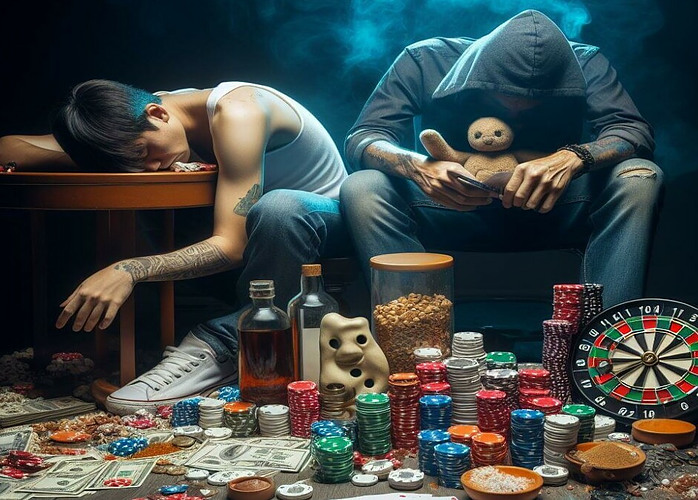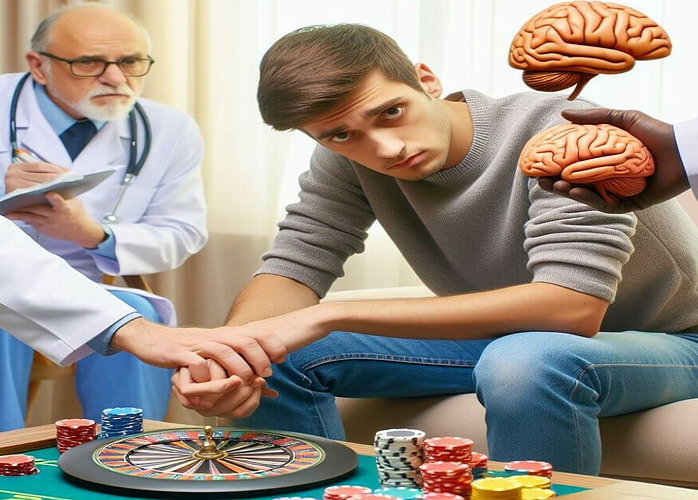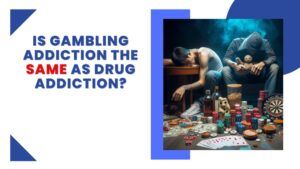I’m here to help you with a clear-eyed look at both gambling and drug addictions. Is gambling addiction the same as drug addiction?
When we talk about addiction, it’s often easy to jump straight to images of substance abuse, but it’s not just about narcotics or alcohol; gambling addiction is also a serious issue that can take a massive toll on someone’s life.
If you want to grasp the essence of addictions, you’ve got to understand that at the core, both gambling and drug addictions are recognized as compulsive behaviors that are hard to control, despite harmful consequences. Addiction comes from a mix of behavioral, emotional, and biochemical factors.
Now, what sets them apart and what do they share?
While drug addiction involves a clear physical element—the substances themselves and their effects on the human body—gambling addiction runs on an emotional and psychological level. It activates the brain’s reward system in similar ways that drugs do, which can lead to a pathological urge to gamble.
This isn’t just about counting losses or chasing the highs of a win, nor is it merely about the withdrawal symptoms of substance abuse. It’s also about the neural pathways that are shaped by the experiences of reward and pleasure, irrespective of whether they come from a chemical substance or a roll of the dice.
In my opinion, the way that society views the two types of addiction plays a mighty role here.
Drug addiction often carries a significant stigma, conceived through a lens of criminality and moral failure. Gambling addiction, on the other hand, might slide under the radar, cloaked by its legal status and mainstream acceptance. This impacts not only public opinion but treatment approaches as well.
Don’t worry too much about pinning down every scientific detail right away. You’re going to find out about how the brain’s chemistry plays a role in both gambling and drug addictions in the next section.
But remember, what happens on a biological level is just one part of the story. Understanding the whole person—their environment, history, and psychology—is where true healing starts.
FREE 4-STEP “CHEAT SHEET” :
Want To Build a PROFITABLE Online Business(but don’t know where to start?)
A Look at The Bio-Psychological Aspects of Gambling Versus Drug Addiction
If you’re trying to grasp how gambling addiction relates to drug addiction, it’s essential to understand the biology and psychology behind it.
At first glance, these might seem like two very different beasts. After all, one involves substances entering the body, while the other doesn’t. But if you dig a little deeper, the lines start to blur.

Gambling and drug use both trigger significant responses in the brain, specifically in the reward circuits. These circuits light up like a Christmas tree when they detect something that feels good.
And guess what?
They don’t particularly care if that ‘something’ is a euphoric drug-induced high or the thrill of hitting the jackpot.
Now, dopamine is a name you’ve probably heard before. It’s often called the ‘feel-good’ neurotransmitter. It’s the same chemical that floods the brain whether you’re winning a poker game or taking certain drugs. This dopamine release is why both gambling and drugs can hijack the brain’s reward system, leading to addiction.
There’s a distinction between psychological dependence, more associated with gambling, and the physical dependence that often accompanies drug abuse.
Gamblers don’t consume a substance, yet they can become mentally hooked to the rush of gambling. In contrast, drug addicts may develop a tolerance to drugs, needing more to achieve the same high, and can experience physical withdrawal symptoms without them.
It’s important to realize that addictions don’t just pop up out of nowhere. Several factors can influence gambling addiction.
These can be both environmental and genetic factors. Someone’s social setting or life stressors can be breeding grounds for addictive behaviors.
Similarly, genetics can also play a role in how susceptible an individual is to addiction, whether it’s to drugs or gambling.
Recommended Reading: What Are The Risks and Rewards Of Gambling?
What Is The Best Treatment and Recovery Approach for Both Types of Addictions?
I can tell you that overcoming addiction is not a one-size-fits-all scenario.
Every journey toward recovery is deeply personal and the treatment has to be tailored around that person. What works for one person might not necessarily work for another, and that’s okay.
If you’re facing the challenge of addiction, know that support systems are invaluable.
These can come in many forms: family, friends, support groups, or professional counselors. You’re not alone, and it’s essential to lean on these pillars of strength as you navigate your path to recovery. In my article, on how to be a responsible gambler, I talked about the various gambling support networks that you can reach out to.

When it comes to therapy and rehabilitation, there’s a lot to consider. Cognitive Behavioral Therapy (CBT), for instance, has shown significant effectiveness in treating both gambling and drug addictions by addressing the thought processes that fuel these behaviors.
In my opinion, it’s crucial not just to focus on the addiction itself, but to address the holistic needs of the individual. This could mean incorporating lifestyle changes, stress management techniques, and even vocational training into the recovery program.
Success Stories of People Who Stopped Gambling and Drug Abuse Is Always Inspirational
It’s always good to read success stories of people who recovered from drug or gambling addiction. It’s proof that if one receives the right treatment and support, then there is hope. Organizations such as NIDA and FacesandVoicesofRecovery have such success stories that you could check out.
Choose something that resonates with you, a treatment approach that you feel is aligned with your values and situation. And remember, your first attempt at recovery doesn’t need to be your last. Recovery is a process, not a destination, and you can always adjust your approach down the road.
Conclusion – You Can Turn Things Around In Your Favour
Think gambling and drug addiction are two peas in a pod? Not quite!
While both can grab hold and take you for a wild ride, they’re pretty different beasts.
I have shown the differences between the two types of gambling. One may promise riches with every spin or bet, and the other offers the illusion of an escape from pain or a numbing balm for reality.
Both can leave you feeling powerless and lost, surrounded by shattered pieces of life.
But as you have read above, there is hope. The magic lies in finding your personalized path to recovery. A tailored solution that helps your circumstance tackles the root of the problem and equips you with tools to navigate every twist and turn.
And guess what? You don’t have to go it alone.
The links in the previous section are where you can find success stories. Their stories are a testament to the power of hope and a reminder that you, too, can reclaim your strength and rewrite your narrative.
But hold on – what if your recovery journey could become a launchpad for something even bigger?
Imagine turning your experience into a beacon of hope for others, building a business powered by passion and purpose, or creating a community that celebrates well-being.
The internet is your playground, teeming with possibilities. You could share your story to inspire, develop an app that offers support, or even build a virtual haven for anyone struggling to find their way. Think of it as creating your ripple effect, a wave of positivity that washes over others.
If you would like to learn how to get started, then check out my article on how you can create an online business based on your passions, or in this case, your experience.
So, as you walk your path to recovery, remember the warrior within. You have the power to heal, the resilience to rebuild, and the potential to build something truly extraordinary.
I wish you everything of the best for 2024 and beyond!
Kind Regards and Take Care
Roopesh

